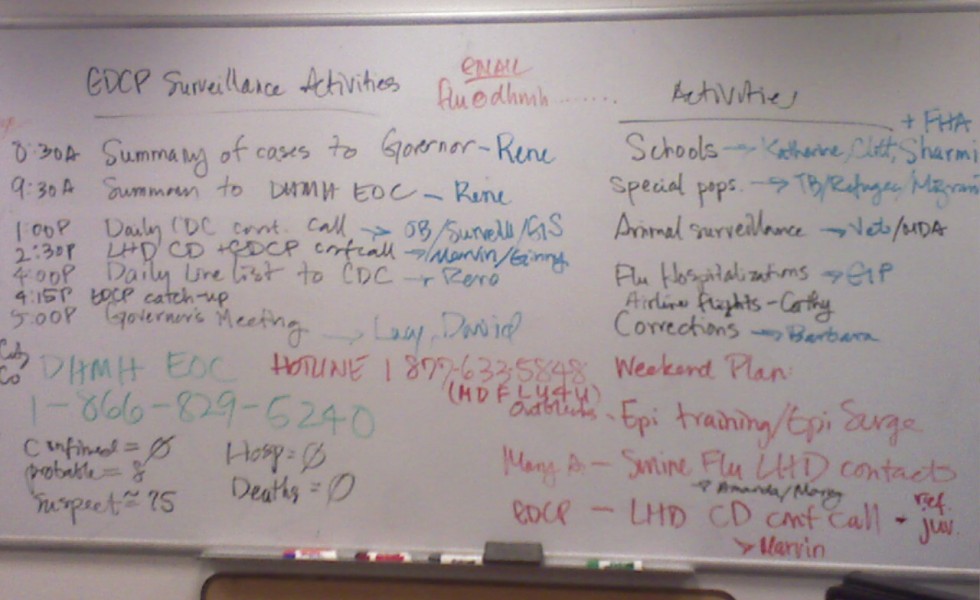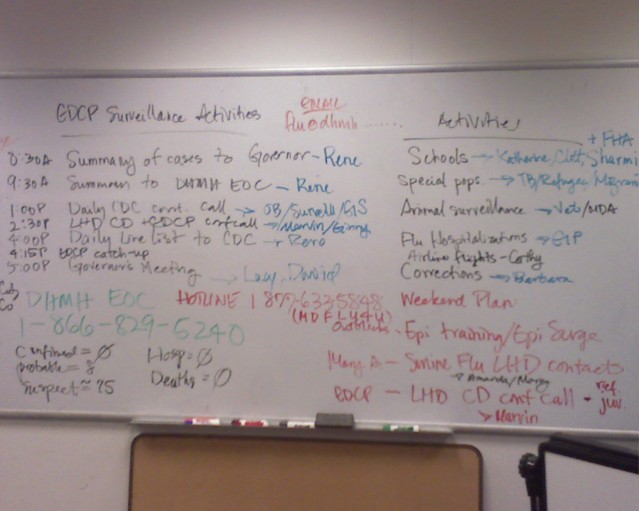So You Want to Work in Professional Public Health?

NOTE: For the purposes of this blog post, “professional public health” means working at a health department, a public health agency, etc. Not in academia. That’s a whole other topic. Also, this blog post is intended for current students in Public Health.
During my time at Hopkins, several people have asked me about working at a health department as opposed to working in academia, so here are a few tips to helping you get a good job at a state or local health department (or even in the Federal Government). At the end, I’ll have a set of links to places where jobs are posted.
Number One: Join A Professional Organization
It is still true that it’s not so much what you know as who you know. One of the best ways to network with people in professional public health is to join professional organizations. You’ve probably heard about the American Public Health Association, but have you heard of the Council of State and Territorial Epidemiologists?
According to their “About” page:
“CSTE is an organization of member states and territories representing public health epidemiologists. CSTE works to establish more effective relationships among state and other health agencies. It also provides technical advice and assistance to partner organizations and to federal public health agencies such as the Centers for Disease Control and Prevention (CDC). CSTE members have surveillance and epidemiology expertise in a broad range of areas including occupational health, infectious diseases, environmental health, chronic diseases, injury control, maternal and child health, and more. CSTE supports effective public health surveillance and good epidemiologic practice through training, capacity development, and peer consultation.”
(In fact, CSTE is a big reason why I got to go to Puerto Rico to work on the Zika outbreak response. Joining CSTE as a student is $30.)
Some states also have their own public health associations. For example, Maryland has the Maryland Public Health Association. It’s $25 to join them as a student. Pennsylvania’s Public Health Association is $20 to join as a student. It’s the same price at the Virginia Public Health Association. APHA has a full list of other state and territorial public health associations.
Number Two: Network
So you’ve joined a professional organization and want to know how to network. This might be a little bit harder for you if you’re an introvert, but it’s not impossible. You need to polish your curriculum vitae and get yourself some decent business cards. On your CV, make sure to include your education, but don’t cram it with every single course you’ve taken (that’s what your school transcript is for). Include your work experience, but don’t cram it with every summer job you’ve held. Focus on what matters to a person looking to fill an epidemiologist job.
So what does matter?
They want to know that you know what an outbreak is, how to recognize it, and what the essential steps in controlling it are. They want you to be able to communicate complex ideas through technical writing and presentations. You might be writing outbreak reports, case reports, or giving the occasional presentation to other staff on what is going on with respect to a situation. Data analysis is essential, but you don’t need to tell them that you know how to do every single kind of regression analysis.
They also want to know how you work independently and as part of a team. There will be times when you’ll be pressed into service to work on an outbreak or some big project. There will also be times when the bosses are busy dealing with something else that requires you to do the work on your own. Of course, it is almost guaranteed that there will be at least one other person that you don’t always get along with. You’ll have to work through it, so make sure to mention that you’ve worked in groups for your labs.
Number Three: Get Experience
It’s hard to get some professional experience while you’re juggling dozens of credit hours and assignments. Many of you will only have your practicums as professional experiences while you’re here. Well, you’re going to need more experience. So how do you get it?
Health departments are strapped for cash right now. Whether you volunteer a few hours here and there, or get a job that is part-time/occasional, try to get some additional experience and exposure to life in “the real world.” When I applied to work at the Maryland Department of Health and Mental Hygiene, one of the questions asked was if I had worked on an outbreak. My response was that, although I’ve done a lot of outbreak scenarios in school, I had not worked on an outbreak. However, I had helped process data from a hospital cluster of MRSA cases, and I had helped the infection prevention nurse get all the literature needed for preventing MRSA. That was a good answer as, often times, figuring out an outbreak is all about gathering everything that is known about the disease/condition and applying it correctly.
Another strategy is to choose your capstone to be something that could be applicable to a health department’s needs. My MPH capstone was about influenza surveillance in rural settings using rapid influenza testing. I showed that influenza activity at the local level was about one to two weeks ahead of influenza activity at the state or national level. When I applied to work at Maryland, I presented them a one-page summary (with graphics) of that capstone project. Luckily, they were looking for an influenza surveillance coordinator. Likewise, for my DrPH, I’ve chosen a thesis project that will be used and give tools to local and state health departments.
Seriously, any experience is good experience. Even working at a fast food restaurant teaches you about working in groups and prioritizing, in addition to basic food sanitation practices. The important thing is to get out there and be able to say that you’ve held a job, are responsible, will be on time, and that you will put all of that together with your epidemiological knowledge to be a very good entry-level epidemiologist.
One Last Thing
You’re already in a very exclusive group when you started working toward your degree in Public Health. Those of us who have our graduate degrees know what you’re going through and what you will be going through in your search for a job within your career. It would do you a lot of good to stay in touch with any colleagues and mentors that you’ve come to know in your studies. A good mentor can get you through a rough patch at work by giving you tips on how to get through it. A good mentor at your place of employment is also crucial. They will know the system and tell you how to navigate adverse situations. At the very least, they’ll warn you if there is trouble ahead. It’ll be up to you whether or not you want to dive into that trouble or steer clear of it.
Good luck out there.
Job Boards
- CSTE Job Board: http://jobs.cste.org/
- APHA Job Board: http://www.apha.org/professional-development/public-health-careermart
- MdPHA Job Board (Requires Membership): http://members.mdpha.org/jobinternship-board/
- Epi Monitor Job Bank: http://www.epimonitor.net/JobBank.htm
- Emory University Rollins School of Public Health Employment Connection: http://cfusion.sph.emory.edu/PHEC/index.cfm
- Epidemiologist Jobs on Indeed.com: https://www.indeed.com/jobs?q=Epidemiologist&l=
- Public Health Jobs: http://publichealthjobs.org/
Additional Tips:
- Get business cards that stand out. For example, I put images of different pathogens and the John Snow cholera map on the back of mine. They stand out and are a conversation starter. Moo.com and VistaPrint.com are two good places to do it online.
- Get a good-looking, professional-looking LinkedIn.com profile. Don’t use LinkedIn like you would use any other social medium. Use it as a way of presenting yourself to the professional world.
- Be mindful of what you share on social media. While it is illegal in many places for employers to ask to see your full social media (e.g. Facebook, Twitter) account, they can still very much see your public postings. So be mindful of what impressions those public postings give. You did relief work in a refugee camp in South Sudan? Post away! Perfected the art of drinking from a beer bong while upside-down? Maybe think twice about posting that. Absolutely hated your previous job? Vent those frustrations with your close friends, in person, over coffee.
- Always come through on your promises and deadlines. If you do an internship, practicum or volunteer someplace hoping to eventually get hired, make sure you meet all the deadlines or “recalibrate expectations” ahead of time if you are going to be late. People are less likely to give you a good recommendation if you were constantly late or unreliable more than anything else.
- Learn to multitask. Look at the picture below. It’s the whiteboard from the Epidemiology unit at the Maryland Department of Health and Mental Hygiene the morning the H1N1 pandemic was declared. See all the things that “René” had to do? Yeah. Multi-task. 😉

That was indeed quite early in the pandemic. 8 probable, around 75 suspected, 0 hospitalized and the always relieving 0 dead.
Fortunately, the 2009 virus wasn’t the most virulent.
LikeLike